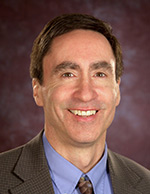Ladies.
Wear shoes that are easy to slip off and on.
Gentlemen.
Check the labels on your neckties.
 William CavanaughThose two simple suggestions might help one prepare to understand the relationship between an afternoon of mall shopping and sharing God’s love through the Eucharist.
William CavanaughThose two simple suggestions might help one prepare to understand the relationship between an afternoon of mall shopping and sharing God’s love through the Eucharist.
Don’t be surprised if checking your shoes or necktie for a manufacturer’s name is part of the latest Forum on Faith and Work breakfast lecture series sponsored by Cardinal Stritch University’s Saint Clare Center for Catholic Life in collaboration with the Catholic Herald.
William Cavanaugh, DePaul University theology professor and author, will explain how a person’s unending desire for “stuff” can transcend into a closer relationship with God during his presentation, “Being Consumed: The Eucharist and Consumer Culture.”
In a telephone interview with the Catholic Herald, Cavanaugh, a senior research professor at DePaul’s Center for World Catholicism and Intercultural Theology, said consumerism has become like a new religion.
Money has become an abstract idol in today’s society, he said.
“Pope Francis has talked about us creating new idols. Worship of the golden calf has returned in the idolatry of money,” Cavanaugh said.
The typical consumer buys stuff, discards it and buys more stuff, Cavanaugh said.
“We move from one novelty to the next,” he said.
The endless cycle of consuming material things, he said, “produces the same sort of restlessness” talked about in a passage from the St. Augustine Confessions – “You have made us for yourself, O Lord, and our heart is restless until it rests in you.”
“We are never fully content with the material world because everything breaks, everything dies. We die,” Cavanaugh said.
Eventually, instead of moving from one material thing to another, an inner desire grows to acquire something that lasts, something eternal.
That something, Cavanaugh said, is God.
Learning how to navigate the road from unending consuming of stuff to consuming God, and being consumed by God through the Eucharist, will be the focus of Cavanaugh’s presentation.
People often think of the Bible and Christianity as being unrealistic and something other-worldly, while economic matters are about hard-nosed reality, Cavanaugh said.
“I will turn those assumptions on their heads and argue much of what we think of as the world market economy is based in fantasy. A real biblical view of things is much more grounded,” Cavanaugh said.
Having people remove their shoes or look at the back of a necktie for manufacturer’s labels often gives the first hint of why it’s so easy to buy stuff and then buy more stuff, he said.
“People become aware of how much stuff we have that comes from halfway around the world,” he said.
Unlike the past, when people into the 19th century made most of their possessions, contemporary consumers have no personal knowledge of the factory or people who made their stuff, he said.
Most people don’t think about the labels that read, “Made in China” or “Made in Taiwan.”
“People find that exhausting. They ignore it,” Cavanaugh said.
The buying of stuff continues, resulting in restlessness and, ultimately, a feeling of personal isolation in the failure to feel fulfilled, he said.
Consuming God and being consumed by him through the consumption of bread and wine during Holy Communion, also known as the Lord’s Supper, erases the restlessness and isolation, Cavanaugh said.
“We believe we consume the body of Christ and then we are consumed by the body of Christ. It turns the act of consumption inside out. Instead of pulling the material world into the self, the self is pulled out into a larger world where we become members of one another,” Cavanaugh said. “If we think of ourselves as being members of one another, if we join together in the Eucharist, we can break down the isolation created by consumerism.”
St. Thomas Aquinas, Cavanaugh said, noted owning private property is OK, “but you should also think of it as being God’s stuff.”
“God is letting us use his stuff, therefore always be ready to communicate your stuff to others in their need,” Cavanaugh said. “There is a real joy in making your material world part of your spiritual world. When you can feel the Eucharist is not something you do for an hour on Sunday, but something you carry with you all week, I think there is deep joy in that.”
Cavanaugh said he strives to make sure people understand the connection between their faith, everyday life, and how they spend their money.
“We have a tendency in our culture to separate out our religion from the rest of life,” he said. “Religion is what you do on Sunday. What you do the rest of the week is something else. I think a lot of what it means to be Catholic and what it means to be a Christian is to try and integrate those things together. Separation of church and state is a good thing, but separation of religion from the rest of life is not a good thing.”
Cavanaugh said he hopes people walk away from his lecture “thinking something is wrong with our economy, but that there are hopeful signs in that if we integrate our faith life with our economic life we can make the world a better place.”
“Just like Pope Francis said, ‘I am a sinner.’ I don’t talk about these matters from any height of virtue,” Cavanaugh said. “I am just someone trying to make sense in how to live the Gospel in an integrated way in a challenging age.”
